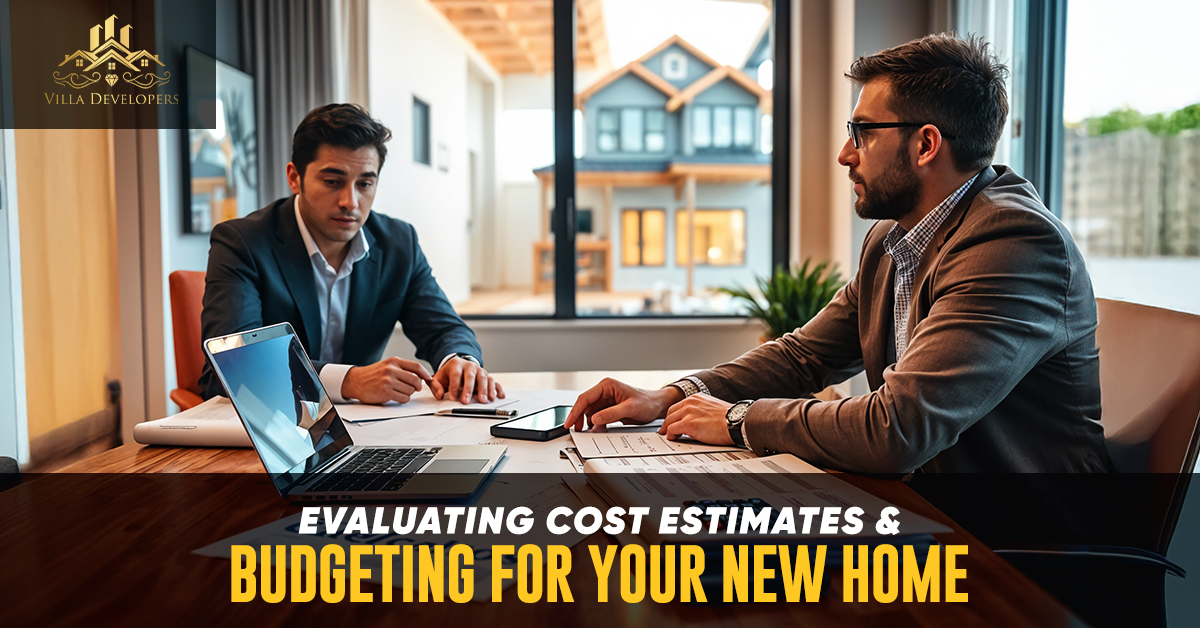
Evaluating Cost Estimates and Budgeting for Your New Home
If you are also thinking about building your own brand new home, a lot of things can scare or overwhelm you including the cost estimates. There are fun parts of a new home construction like interior and final touches, and similarly, there are some not so fun parts, like logistics, setting timelines and also most importantly: deciding and sticking to a budget. Understanding how to evaluate home cost estimates and plan your budget can make the difference between a smooth and stressful experience. So, In this article, we will explore how you can confidently manage the financial side of home construction using our budgeting tips and practical checklists.
Understanding the Basics of Home Construction Costs
First off, let’s make a list of what goes into a new home construction’s cost estimate. Building a house isn’t as simple as adding up the price of bricks and mortar because it includes a very detailed and tedious home construction cost breakdown.
- Land acquisition and preparation: The cost of buying land, clearing it, and preparing the site.
- Materials: Everything from foundation to roof, including finishes like flooring, carpentry, appliances, and fixtures.
- Labor: Skilled tradespeople, subcontractors, and project managers who are on board with your expectations.
- Permits and fees: Building permits, inspections, and other major and minor regulatory costs.
- Design and planning fees: Architect, interior/exterior designer, and engineering fees.
- Contingency funds: An extra percentage to cover unexpected or unforeseeable charges such as shipping costs for imported furniture, appliances, etc, or any natural disasters.
Approaching these components with a clear, organized mindset is the way to go for new home construction budgeting. It not only makes sure that you can set realistic expectations but also prevents surprises down the road.
How to Evaluate Home Cost Estimates
When you receive a cost estimate from a builder, don’t just nod and agree. Take the time to nitpick into the details. Here’s how to evaluate home cost estimates like a pro from our pros:
- Breakdown Analysis: Scrutinize each line item. Is the cost of plumbing in line with market rates? Are the labor hours reasonable for the nature of the work? This will tell you the overall number and highlight any leeway for negotiation.
- Compare Multiple Estimates: Gather quotes from at least three builders. This cost estimate guide for building a home can tell whether one bid seems unusually high or low and why.
- Check for Missing Elements: Sometimes quotes omit costs for permits, site cleanup, or even much-needed infrastructure like driveways. Ask for a comprehensive list and question any uncertainties.
- Inclusions vs. Exclusions: Some estimates include basic finishes, while others assume you’ll upgrade them separately. Make sure that you know what is covered so there is no need to worry about money separately when you get to the paint and flooring stage.
By methodically reviewing estimates, you’re essentially creating a new home-building budget checklist that will guide both your decisions and discussions with contractors.
Budgeting Tips for a New Home Construction
Budgeting for a new home goes beyond just matching figures on paper. It should also include strategic planning, foresight, and, of course, some flexibility. Here are some friendly budgeting tips for a new home that can keep your finances in check and your project stress-free:
- Set a Realistic Budget: Don’t just plan for the construction cost. Consider land, design fees, landscaping, and an extra cushion for unexpected expenses.
- Prioritize Features: Determine which features of your dream home are non-negotiable and which you can compromise on if costs start to creep up.
- Keep Contingency Funds: All of our new home-building experts also suggest setting aside 10-20% of your total budget as a buffer. This safety net covers many other extra expenses like delays or design changes.
In Maryland, for example, the average new home construction budgeting might range from $150 to $250 per square foot, depending on location, materials, and finishes. This range helps set expectations, but careful planning can keep you on track so that your project is more predictable and less stressful.
- DIY Where Possible: If you’re handy, maybe you can handle some finishing touches, like painting, wall art, or even landscaping. This brings labor costs down and also frees up the budget for luxury upgrades.
- Monitor Spending: Regularly compare your actual spending against your budget. Early detection of deviation from the set budget allows adjustments such as swapping expensive fixtures for more affordable alternatives before they get out of control.
By following a disciplined budget plan, you’re making sure that each dollar spent directly contributes to building your vision without compromising quality or design.
How to Hire a Home Builder with a Budget Set in Mind
While evaluating costs, ask these tips for hiring home builders to keep your budget on course:
- Transparent Pricing: Choose builders who provide detailed and itemized bids. Hidden fees or vague estimates can easily lead to overspending later, which can be a problem.
- Experience with Budgets: Builders experienced in managing new home building costs usually have processes to prevent extra expenses. Ask about their strategies for staying on budget.
- Communication on Financial Changes: How do they manage any changes? A reliable builder informs you of potential budget increases in advance, giving you control over decision-making.
By incorporating these strategies, you can transform budgeting from a scary and daunting chore into an empowering aspect of your life during cost estimates and budgeting for a new home.
Evaluating the Criteria for a Reliable Builder
Budgeting ties very closely to the kind of builder you hire. Experienced and reputable builders will always help you save money in the long run through efficient work, quality materials, and fewer mistakes.
- Qualifications and Experience: While not strictly about money, hiring experienced home builders can reduce unexpected costs by a big margin. That is because they have been in this industry long enough to know how to avoid any problems that could burn a hole in your wallet.
- References and Past Projects: Speak to previous clients about their budgeting experience. Did the project stay on the pre-decided timeline? Were there surprises that inflated costs?
- Project Management Skills: A builder with solid project management and budgeting tools can already foresee issues, forecast them clearly to you, and change plans to make sure that you get the best bang for your buck.
How to Choose the Right Financing and Payment Options
Once you have a solid budget and a builder, financing becomes a matter of connecting those dots without breaking the bank. Here are some new home construction budgeting considerations related to finances:
- Loan Types: Investigate construction loans, which cover the building phase before converting to a mortgage.
- Progress Payments: Understand the payment schedule in your contract. Avoid large upfront deposits and instead opt for milestone payments as the work progresses.
- Fixed vs. Variable Estimates: Some builders might offer a fixed-price contract, which reduces the risk of surprises, while others give a variable estimate that can shift. You have to make up your mind about which option suits your financial risk tolerance.
It is also very wise to consult a financial advisor or a lender familiar with construction financing. They can guide you on interest rates, loan terms, and how to manage cash flow throughout the build. This step, though slightly outside the direct realm of home construction cost breakdown, is vital to your overall financial well-being during the project. That will help you be confident in your choice of new home builder.
Common Mistakes in Cost Estimates and How to Avoid Them
Even with diligent planning, things happen. Awareness of some common issues can, therefore, save you time, money, and stress:
- Underestimating Site Preparation Costs: Things like tree or shrub removal, soil stabilization, or demolition of an existing structure can increase costs unexpectedly. Always include a contingency for these items.
- Neglecting Design Changes: Getting caught up in creative ideas during construction is easy. But significant changes mid-build often come with heavy price tags. Commit to big decisions early on or factor potential changes into your contingency fund.
- Choosing the Cheapest Option: While saving money is wise, cutting corners might give you inferior quality, delays in shipping, or future repairs that actually cost more in the long run. That is why one of the benefits of hiring professional home builders is a slightly higher upfront cost for peace of mind and fewer headaches.
Real-World Data: What Are Homes in Maryland Actually Costing?
When planning your budget, it helps to know what similar projects cost. In Maryland, recent data shows that new homes typically range from $150 to $250 per square foot, depending on factors like location, materials, and design. For example, a 3,000-square-foot custom home might range between $450,000 and $750,000. However, if you want to go for luxury finishes or the latest tech and sustainability features, prices can soar much higher.
Understanding these ranges gives you a fair benchmark to judge the prospective new home builders you want. During your discussions with builders, comparing their quotes against these averages can help you easily decide if you’re getting a fair deal or if you should be looking for other options that are necessary.
Summing Up
Constructing a new, custom home can definitely take away a chunk of your savings in just a couple of months, and we get how it can be the biggest investment that most of us can make in our lifetimes. That is why we also understand the importance of pinching pennies and cutting corners the right way when you are trying to hire a new home builder. Understanding how to evaluate home cost estimates and effectively budgeting gives you control, minimizes stress, and sets the stage for the successful completion of the project.
By asking the right questions, comparing multiple bids, and carefully planning your budget, you can manage the cost estimate guide for building a home with confidence. Keep a detailed home construction cost breakdown handy, adhere to solid budget planning for new homes, and remember: the goal isn’t just to build a house but to create a forever home that levels up your lifestyle, dreams, and financial plan.
If you are still not clear about your new home build estimate, you can contact one of our experts at Villa Developers. Whether you’re a first-time homeowner or building a new space, managing costs effectively allows you to focus on the fun parts of designing spaces that reflect who you are, watching your dream come to life, and eventually stepping into a home that’s truly yours. That is why we take away the stress part of the job, i.e., the logistics and all of the financial planning. Reach out to us today, book your free consultation with us, and get ready to have experienced new home builders on the team with you!
